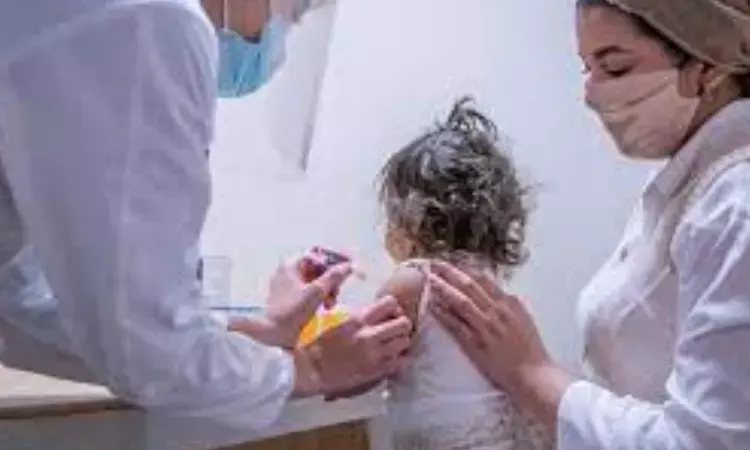- Home
- Medical news & Guidelines
- Anesthesiology
- Cardiology and CTVS
- Critical Care
- Dentistry
- Dermatology
- Diabetes and Endocrinology
- ENT
- Gastroenterology
- Medicine
- Nephrology
- Neurology
- Obstretics-Gynaecology
- Oncology
- Ophthalmology
- Orthopaedics
- Pediatrics-Neonatology
- Psychiatry
- Pulmonology
- Radiology
- Surgery
- Urology
- Laboratory Medicine
- Diet
- Nursing
- Paramedical
- Physiotherapy
- Health news
- Fact Check
- Bone Health Fact Check
- Brain Health Fact Check
- Cancer Related Fact Check
- Child Care Fact Check
- Dental and oral health fact check
- Diabetes and metabolic health fact check
- Diet and Nutrition Fact Check
- Eye and ENT Care Fact Check
- Fitness fact check
- Gut health fact check
- Heart health fact check
- Kidney health fact check
- Medical education fact check
- Men's health fact check
- Respiratory fact check
- Skin and hair care fact check
- Vaccine and Immunization fact check
- Women's health fact check
- AYUSH
- State News
- Andaman and Nicobar Islands
- Andhra Pradesh
- Arunachal Pradesh
- Assam
- Bihar
- Chandigarh
- Chattisgarh
- Dadra and Nagar Haveli
- Daman and Diu
- Delhi
- Goa
- Gujarat
- Haryana
- Himachal Pradesh
- Jammu & Kashmir
- Jharkhand
- Karnataka
- Kerala
- Ladakh
- Lakshadweep
- Madhya Pradesh
- Maharashtra
- Manipur
- Meghalaya
- Mizoram
- Nagaland
- Odisha
- Puducherry
- Punjab
- Rajasthan
- Sikkim
- Tamil Nadu
- Telangana
- Tripura
- Uttar Pradesh
- Uttrakhand
- West Bengal
- Medical Education
- Industry
Even a single course of antibiotics may affect gut microbiota of infants

"The results of our research strongly indicate that bacteria in the gut regulate the fungal microbiota and keep it under control. When bacteria are disrupted by antibiotics, fungi, Candida in particular, have the chance to reproduce," says PhD student Rebecka Ventin-Holmberg from the University of Helsinki.
A new key finding in the study was that the changes in the fungal gut microbiota, together with the bacterial microbiota, be part of the cause of the long-term adverse effects of antibiotics on human health.
Long-term changes in infant gut microbiota
Antibiotics are the most commonly prescribed drugs for infants. They cause changes in the gut microbiota at its most important developmental stage. These changes have also been found to be more long-term compared with those of adults.
"Antibiotics can have adverse effects on both the bacterial and the fungal microbiota, which can result in, for example, antibiotic-associated diarrhea," Ventin-Holmberg says.
"In addition, antibiotics increase the risk of developing chronic inflammatory diseases, such as inflammatory bowel disease (IBD), and they have been found also to have a link to overweight," she adds.
These long-term effects are thought to be caused, at least partly, by an imbalance in the gut microbiota.
In the gut, everything is connected
The recently published study involved infants with a respiratory syncytial virus (RSV) infection who had never previously received antibiotics. While some of the children were given antibiotics due to complications, others received no antibiotic therapy throughout the study.
"Investigating the effects of antibiotics is important for the development of techniques that can be used to avoid chronic inflammatory diseases and other disruptions to the gut microbiota in the future," Ventin-Holmberg emphasises.
While the effect of antibiotics on bacterial microbiota has been previously investigated, studies on fungal microbiota have been scarce. The findings of this study indicate that fungal microbiota may also have a role in the long-term effects of imbalance in the gut microbiota.
"Consequently, future research should focus on all micro-organisms in the gut together to better understand their interconnections and to obtain a better overview of the microbiome as a whole," Ventin-Holmberg notes.
For further information:
DOI: 10.3390/jof8040328
Dr Kamal Kant Kohli-MBBS, DTCD- a chest specialist with more than 30 years of practice and a flair for writing clinical articles, Dr Kamal Kant Kohli joined Medical Dialogues as a Chief Editor of Medical News. Besides writing articles, as an editor, he proofreads and verifies all the medical content published on Medical Dialogues including those coming from journals, studies,medical conferences,guidelines etc. Email: drkohli@medicaldialogues.in. Contact no. 011-43720751


